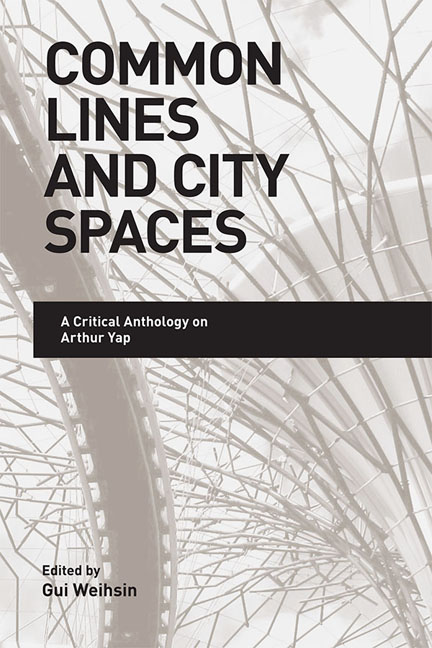Book contents
- Frontmatter
- Contents
- Acknowledgements
- About the Contributors
- 1 Common Lines and City Spaces: Introduction
- 2 The Transformation of Objects into Things in Arthur Yap's Poetry
- 3 “the same tableau, intrinsically still”: Arthur Yap, Poet-Painter
- 4 “go to bedok, you bodoh”: Arthur Yap's Mapping of Singaporean Space
- 5 On Places and Spaces: The Possibilities of Teaching Arthur Yap
- 6 Arthur Yap's Ecological Poetics of the Daily
- 7 “except for a word”: Arthur Yap's Unspoken Homoeroticism
- 8 “a long way from what?”: Folkways and Social Commentary in Arthur Yap's Short Stories
- Index
- Plate section
5 - On Places and Spaces: The Possibilities of Teaching Arthur Yap
Published online by Cambridge University Press: 19 May 2017
- Frontmatter
- Contents
- Acknowledgements
- About the Contributors
- 1 Common Lines and City Spaces: Introduction
- 2 The Transformation of Objects into Things in Arthur Yap's Poetry
- 3 “the same tableau, intrinsically still”: Arthur Yap, Poet-Painter
- 4 “go to bedok, you bodoh”: Arthur Yap's Mapping of Singaporean Space
- 5 On Places and Spaces: The Possibilities of Teaching Arthur Yap
- 6 Arthur Yap's Ecological Poetics of the Daily
- 7 “except for a word”: Arthur Yap's Unspoken Homoeroticism
- 8 “a long way from what?”: Folkways and Social Commentary in Arthur Yap's Short Stories
- Index
- Plate section
Summary
The personae in Arthur Yap's poetry are often standing still, immobilized and yet moved to contemplation. The often-unnamed settings in his poems frequently receive a second or third mental visitation, as if inviting us to explore the treatment of the spaces and places of his poetry. This essay takes up Yap's poetic invitation while at the same time approaching Yap's poetry from a critical as well as pedagogical perspective. The first part of the essay deals with the initial frustrations and difficulties of reading Yap's poems, which are often solipsistic and reflexive, as if refusing to engage with social reality and hence not always amenable to a reading that probes for their engagement with social and cultural issues. As a reader, writer, and teacher of poetry and literary criticism, I draw on my personal encounters with Yap's writing in order to illustrate the uniqueness of his style and illuminate the nuances of his verse. The second part of the essay draws on basic concepts of urban and cultural geography to enable an examination of spaces and places in Yap's poetry. The last part of this essay looks at Yap's poetry through general insights offered by Henri Lefebvre in his book The Production of Space and more recent and specific scholarship on the relationship between space and history in Singapore. These provide a useful starting point for understanding how Yap maps a variety of spaces and critiques spatial practices in Singapore.
ENCOUNTERING YAP'S SOLIPSISM AND REFLEXIVITY
I first encountered Arthur Yap's poetry alongside those of Edwin Thumboo and Lee Tzu Pheng as an undergraduate at the National University of Singapore. Unsurprisingly, I was frustrated by Yap's poems; unlike other poems such as Thumboo's “Ulysses by the Merlion” that cements the relationship between poetry and nation building and Lee's “My Country and My People” that is wary of being co-opted by patriotic discourse, Yap's verse seems hesitant about saying anything in this regard. Yap's poems read frequently like arrested departures; they are often negations of the past without any promise of a movement into the present or future.
- Type
- Chapter
- Information
- Common Lines and City SpacesA Critical Anthology on Arthur Yap, pp. 96 - 113Publisher: ISEAS–Yusof Ishak InstitutePrint publication year: 2014

